
September 19-23, 2023
Himarë
I just got done reading a book I’d downloaded on my kindle called Mother Tongue: The Saga of Three Generations of Balkan Women, by Tania Romanov. I often look to read historical fiction or memoirs about the country I’m visiting. It really helps to gain insight into the people and history of a region.
The story follows three generations of women that lived in Croatia, Italy, Serbia, and what was once Yugoslavia from 1911 through 1992.
They lived with ethnic hatred and fascist dictators that rose to power, such as Mussolini. There were constant fights over land, and the resulting wars. They were forced to lose everything and relocate more than once in their lifetimes.
The Balkans
We’ll be traveling north to some of those regions soon. But for now, we are here in the small seaside village of Himarë (pronounced Himara), Albania, in a small hotel on the sea.
We have a refrigerator in our hotel room, so we stopped at a mini-market to pick up some drinks and fruit.
The Mini-Mart Incident
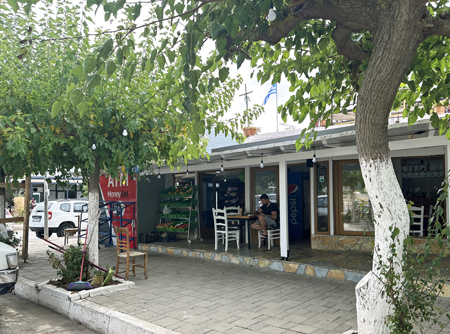
The tiny market, only a minute from our hotel, has fresh fruit out front in crates. We grabbed a few bananas, then went inside and collected several sparkling waters from the cold case.
We brought our own bag and set it on the counter. Steve was taking care of the payment. I took that opportunity to check the notes app on my phone, to refresh myself on the Albanian word for thank you.
The Albanian Language
I still hadn’t come anywhere close to mastering the word thank you in Albanian. It certainly wasn’t just rolling off my tongue. I was still having a hard time even remembering it.
The previous day at lunch I had successfully said thank you in Albanian to our waiter. I was happy for this opportunity to try it out again.
Faleminderit (Thank You)
“Fal-eh-meen-dey-reet“, I said, directly to the shopkeeper.
I tried to say it as quickly as I could. I wanted it to sound like the one word that it is, rather than several disconnected sounds. It went pretty well. I felt pretty good about it.
Did I Do Good?
I looked up from my phone, ready to see an understanding smile and appreciation for my efforts.
Instead, I was greeted by the scowling face of the older, dark haired shopkeeper. He had stopped everything. His brow was furrowed in deep lines and his head dipped forward and down in my direction. He pressed his dark, bushy eyebrows out somewhat aggressively towards me. I could tell he was almost fuming. He just glared at me.
Before I could gather myself, the shopkeeper puffed up his chest and, quite passionately, said “No, nooooo! I am Greek. Do not use that word here!”
I was in shock. There was a momentary pause where I just stood in disbelief. Was this really happening? I had been so proud of myself.
A Quick Exit
Flustered, I shoved my phone into my fanny pack, turned, and left the store, hoping Steve was following close behind. He was.
Looking back it was somewhat humorous. We did get our bearings rather quickly, and had a bit of a laugh about the whole thing. So much for ingratiating myself with the locals by using the local language.
A Google Search
I decided it was time to do some research. There was obviously more going on here than I was aware of. Yep, time to delve a bit into the local history of this region.
A quick google search and I suddenly had a whole new perspective on the area. There was a long and sordid history of ethnic tensions between the Albanians and the Greeks specifically in this region of Himarë. There has been controversy over the lands and between the residents forever, and it continues to this day.
I’m making no judgements on who is right or wrong here, I’m just trying to get myself a bit more educated.
Who Came First?
Greeks say they are the original Himarjotsa and the majority in the region, and Albanians claim the same. The 2011 census, the last reliable data, has the Albanians as the majority, but the Wikipedia page has the Greeks as the majority. But the Albanians claim that Wikipedia page was written by Greeks. And it goes on and on.
I’m obviously oversimplifying. It’s very complex and goes back years and years and years. And it’s still going on.
The Major Scandal
As recently as a few weeks ago, in mid-August, a scandal with national implications erupted here in Himarë involving the newly elected major. The major was accused of buying votes and was arrested. He is currently being detained.
The Greek authorities were horrified and claimed the major, who is an Albanian citizen with Greek nationality, was only arrested because of his Greek connections. This ultimately led to the mayors of both Athens and Thessaloniki, Greece, joining a protest in the little village of Himarë.
There are far reaching implications with this entire incident. Albania has applied for European Union status and is under scrutiny for its justice system fairness, so now the Albanian Prime Minister is involved too.
Just as in my book, there is a very long history of ethnic tension here in this quaint, idyllic seaside village.
And yes, I had to jump right into it with both feet with a simple wish to say thank you.
Seasonal Shutdown
I knew mid-September was getting towards the end of the summer season in this seaside town. Even so, we were surprised to find only 2-3 restaurants still opening up for service on the south end of town, where we are staying.
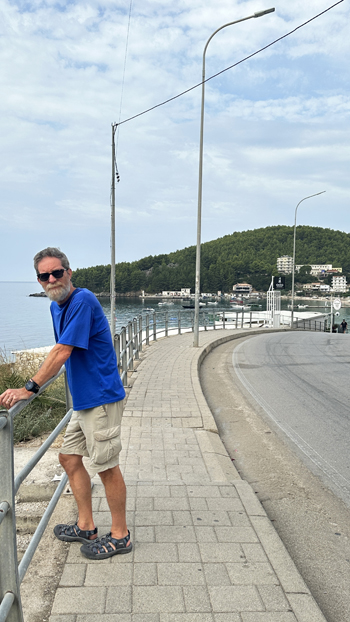
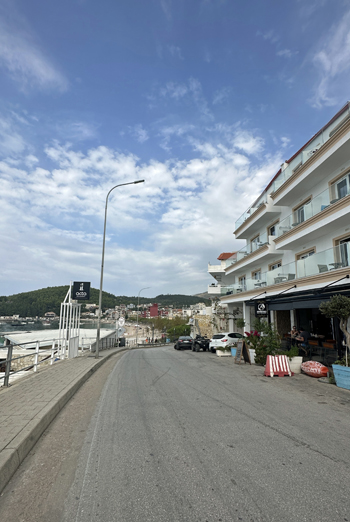
The streets are pretty empty. Not much traffic to contend with.
If we walk 10-15 minutes, following the main street up and over a small hillside, we reach the northern part of town. It has a more touristy feel and is more built up. There are also more open restaurants, but still only about half are providing service.
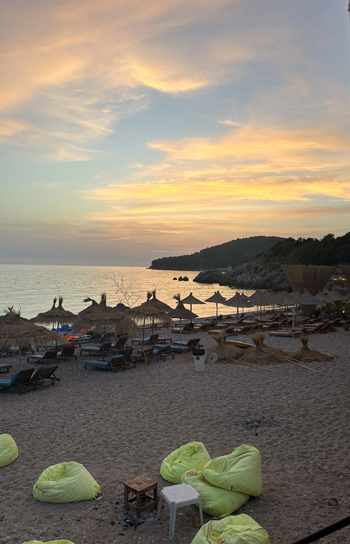
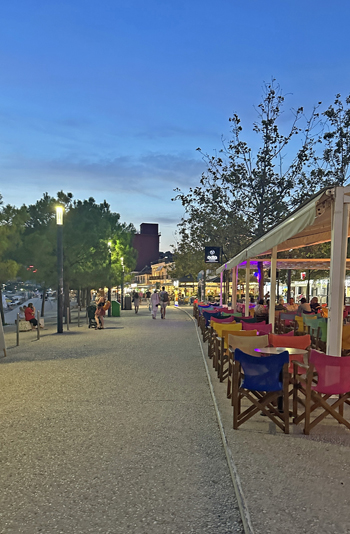
There are numerous, large beach bars along the beautiful waterfront here. Many have cool mood lighting and sophisticated sound systems (for a D.J.), but only a handful of sedate patrons were in the bar, and all was quiet for our stay.
There’s hundreds of lounge chairs and umbrellas too, but most are folded up for the winter. Maybe 10-15% are being used this week.
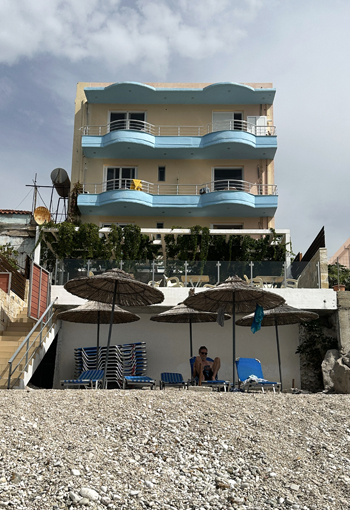
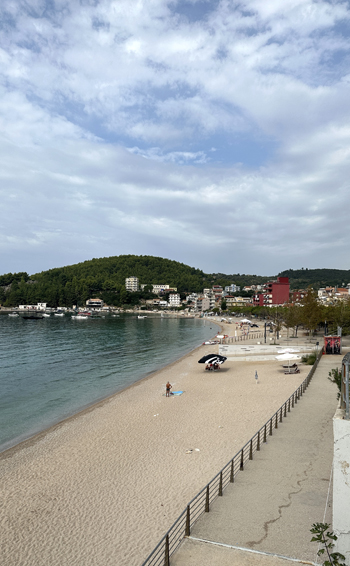
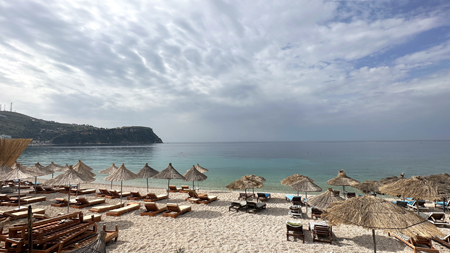
We just barely made it in time before the whole town closes for the winter and we’re so glad we did.
I’m sure our experience here would have been very different in the busy summer season, but we were happy to have a slow & quiet retreat.
The Beach
Himarë is located on the Himarë Gulf of the Ionian Sea, surrounded by the treed Llogara mountains.
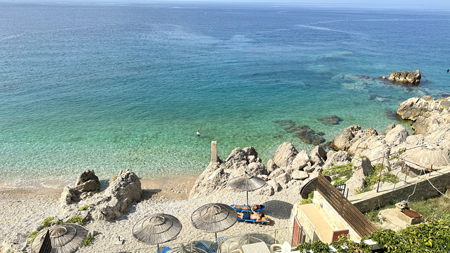
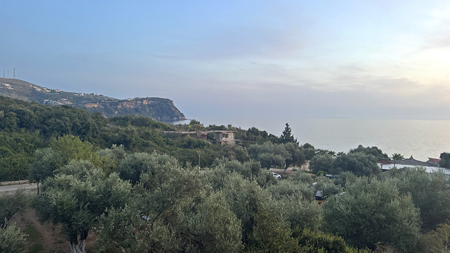
At our hotel, Mare Bed & Breakfast, we have our own tiny private beach cove. It’s surrounded by jagged white rocks on either side that open to a perfect little entrance into the clear turquoise water. Our “cove” readily connects to a much larger beach, but it’s easy to pretend it’s all ours.
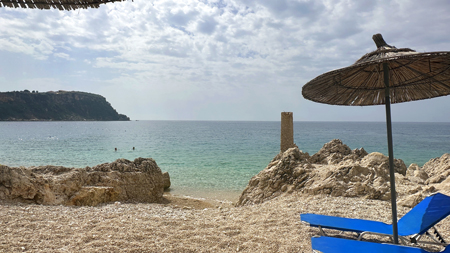
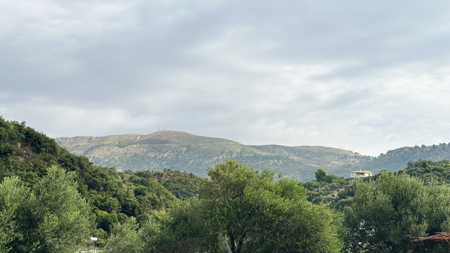
Bunkers
Our amazing view from our ocean front third floor hotel room includes an odd sight. Just to the right of our little beach area are two round, cement and steel, pod-like bunkers.
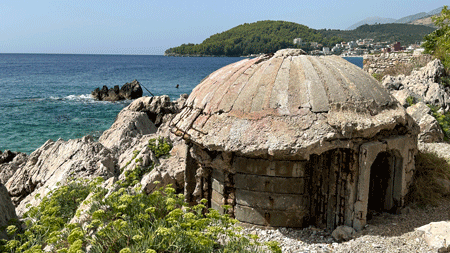
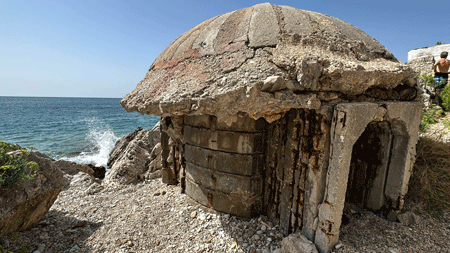
They measure maybe 10’ across and appear to be only 4-5’ high. These particular bunkers have a nice view of the Ionian Sea.
The mushroom shaped bunkers are unique to Allbania. They were built during the Cold War, in secrecy, in the 1970s and 1980s, by Albania’s Communist dictator, Enver Hoxha, who ran a paranoia-fueled regime.
There is a bunker for every 14 square miles all over Albania. Estimates put the total number of Bunkers at up to 750,000!
Getting Around
It’s almost time to head out of Himarë , so it’s time to try to get our ducks in a row, so to speak. Public transportation is an interesting adventure here in Albania. Similar to Turkey, getting from town to town is best done by the mini-bus system. In Turkey the small vans are called Dolmus. Here, in Albania they’re called Furgons.
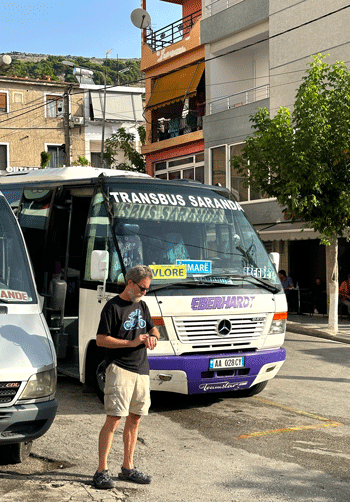
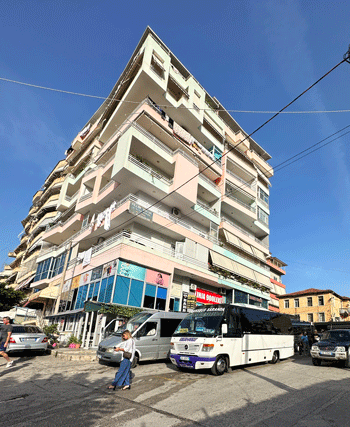
Time to Plan?
It’s a bit of a puzzle to plan transport to the next town. The first step is to figure out where the furgons gather. There’s not a bus terminal in the towns we’ve been in so far. Instead, the buses gather in an area on the side of the street where they stop to load & unload. The location is typically in the center of the town, but you have to know exactly where.
It’s a bit hit or miss because if you ask around, you often you get conflicting answers. It’s best to ask many sources and get a consensus, then actually walk to the designated spot to vertify the furgons are actually there!
We’d ask at our hotel, at lunch, in a mini-mart, or approach someone that looks friendly on the street. We’d also pose the question on a travel forum.
The Bus Schedule
Sometimes there is a schedule posted on an A-Board where the furgons have amassed. Unfortunately, the schedule seems to have no discernible connection to reality. And it’s not like you can check an online bus schedule either – those don’t exist for furgons.
Each furgon has a large sign posted in the front window listing its destinations. So it’s just a matter of searching around until you find your ride. The drivers are typically hanging around somewhere in the close vicinity. They’re usually smoking a cigarette, and are happy to help direct you to the right rig.
The Actual Event
The morning of our departure from Sarandë (to Himarë), the furgon with “Vlore, Himarë ” in the window was the first bus we encountered. Steve walked to the back by the trunk area and the driver loaded up our backpacks.
I’ve read over and over that the furgons leave for their destination when they’re full, but that hasn’t been our experience. More typically the driver knows the exact time of departure.
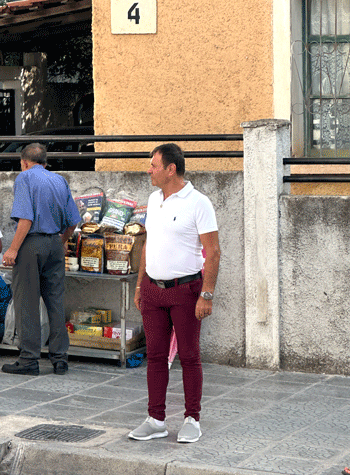
Our driver, in his skin tight, dark purple pants and bright white polo shirt, had gone over to the shady side of the street, opposite the furgon. He was hanging out, yelling out to the occasional friend that drove by. I approached him and asked what time the bus leaves. Thankfully it was in about 20 minutes (9:00 in the morning).
I’d also read that the furgon can be jam-packed (standing room only), with no air conditioning, and basically miserable. Maybe it’s because we’re in the shoulder-season, but we each had a seat and our furgon had decent air conditioning too. It’s still in the mid-80’s, so we sure were thankful for the A/C.
It’s not in my nature to wing-it, so traveling by furgon (or dolmus in Turkey) is a bit out of my comfort zone, but that’s ok (not that I have a choice – haha). And we’ve been incredibly lucky using both the dolmus system in Turkey, and, so far, the furgon system in Albania.
Let’s hope that continues.
WINS & LOSSES
Wins
It sure was nice having four lazy, relaxing beach days in Himarë . Half the days we had our beach all to ourselves. Soooo nice.
Losses
The Wet Room
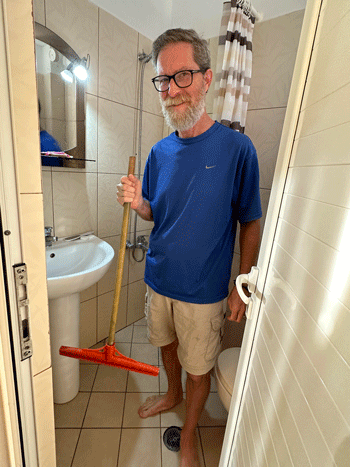
We were first introduced to a wet bathroom in Thailand years ago. And now we’re getting a refresher here in Himarë.
Yes, it’s a bathroom with toilet, sink, and shower, all in one 4 foot by 4 foot space! So when you shower, it’s in one happy, condensed, multi-purpose, wet room! Good space saving idea and mighty functional.
Oh, and a gigantic squeegee almost the size of a push broom is provided so you can help dry things up a bit faster when you’re done showering. No instructions necessary. Just finish up your shower, grab the squeegee, and push the water towards that center drain. There’s nothing to it!
The success to having a wet room involves careful planning. Just make sure all your travel companions have used the bathroom prior to your shower. You’ll need a good 30 minutes plus before re-entering!
Great post, traveling Tracy! 🙂